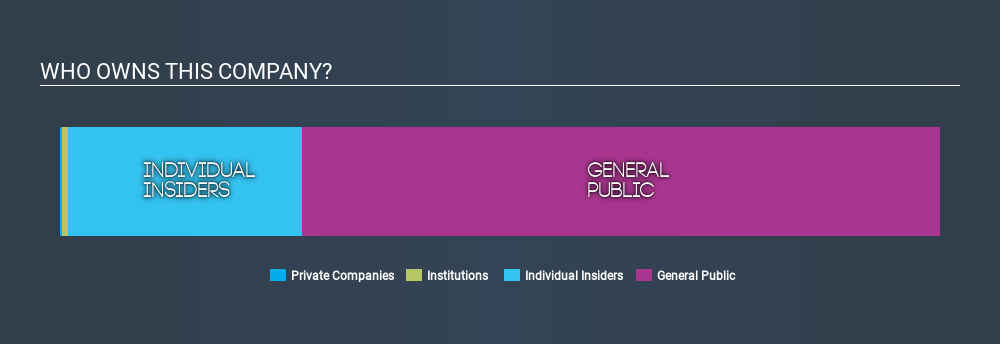- Canada
- /
- Metals and Mining
- /
- TSXV:PGC
What Kind Of Shareholder Owns Most Plato Gold Corp. (CVE:PGC) Stock?

A look at the shareholders of Plato Gold Corp. (CVE:PGC) can tell us which group is most powerful. Insiders often own a large chunk of younger, smaller, companies while huge companies tend to have institutions as shareholders. Warren Buffett said that he likes 'a business with enduring competitive advantages that is run by able and owner-oriented people'. So it's nice to see some insider ownership, because it may suggest that management is owner-oriented.
Plato Gold is not a large company by global standards. It has a market capitalization of CA$5.3m, which means it wouldn't have the attention of many institutional investors. In the chart below, we can see that institutions are not really that prevalent on the share registry. We can zoom in on the different ownership groups, to learn more about Plato Gold.
Check out our latest analysis for Plato Gold

What Does The Lack Of Institutional Ownership Tell Us About Plato Gold?
Institutional investors often avoid companies that are too small, too illiquid or too risky for their tastes. But it's unusual to see larger companies without any institutional investors.
There are many reasons why a company might not have any institutions on the share registry. It may be hard for institutions to buy large amounts of shares, if liquidity (the amount of shares traded each day) is low. If the company has not needed to raise capital, institutions might lack the opportunity to build a position. Alternatively, there might be something about the company that has kept institutional investors away. Plato Gold might not have the sort of past performance institutions are looking for, or perhaps they simply have not studied the business closely.

Plato Gold is not owned by hedge funds. Looking at our data, we can see that the largest shareholder is the CEO Anthony Cohen with 21% of shares outstanding. The second and third largest shareholders are Greg K. Wong and James Cohen, holding 2.6% and 2.5%, respectively. They also hold the titles of Chief Financial Officer and Member of the Board of Directors, respectively. This once again signifies considerable insider ownership amongst the company's top shareholders.
Our studies suggest that the top 6 shareholders collectively control less than 50% of the company's shares, meaning that the company's shares are widely disseminated and there is no dominant shareholder.
While studying institutional ownership for a company can add value to your research, it is also a good practice to research analyst recommendations to get a deeper understand of a stock's expected performance. As far I can tell there isn't analyst coverage of the company, so it is probably flying under the radar.
Insider Ownership Of Plato Gold
While the precise definition of an insider can be subjective, almost everyone considers board members to be insiders. Company management run the business, but the CEO will answer to the board, even if he or she is a member of it.
Most consider insider ownership a positive because it can indicate the board is well aligned with other shareholders. However, on some occasions too much power is concentrated within this group.
It seems insiders own a significant proportion of Plato Gold Corp.. It has a market capitalization of just CA$5.3m, and insiders have CA$1.4m worth of shares in their own names. I would say this shows alignment with shareholders, but it is worth noting that the company is still quite small; some insiders may have founded the business. You can click here to see if those insiders have been buying or selling.
General Public Ownership
The general public, who are mostly retail investors, collectively hold 72% of Plato Gold shares. With this size of ownership, retail investors can collectively play a role in decisions that affect shareholder returns, such as dividend policies and the appointment of directors. They can also exercise the power to decline an acquisition or merger that may not improve profitability.
Next Steps:
It's always worth thinking about the different groups who own shares in a company. But to understand Plato Gold better, we need to consider many other factors. Consider for instance, the ever-present spectre of investment risk. We've identified 3 warning signs with Plato Gold (at least 2 which are a bit concerning) , and understanding them should be part of your investment process.
Of course this may not be the best stock to buy. So take a peek at this free free list of interesting companies.
NB: Figures in this article are calculated using data from the last twelve months, which refer to the 12-month period ending on the last date of the month the financial statement is dated. This may not be consistent with full year annual report figures.
If you spot an error that warrants correction, please contact the editor at editorial-team@simplywallst.com. This article by Simply Wall St is general in nature. It does not constitute a recommendation to buy or sell any stock, and does not take account of your objectives, or your financial situation. Simply Wall St has no position in the stocks mentioned.
We aim to bring you long-term focused research analysis driven by fundamental data. Note that our analysis may not factor in the latest price-sensitive company announcements or qualitative material. Thank you for reading.
About TSXV:PGC
Plato Gold
An exploration company, engages in the exploration and development of mineral properties in Canada.
Slight and overvalued.
Market Insights
Community Narratives



